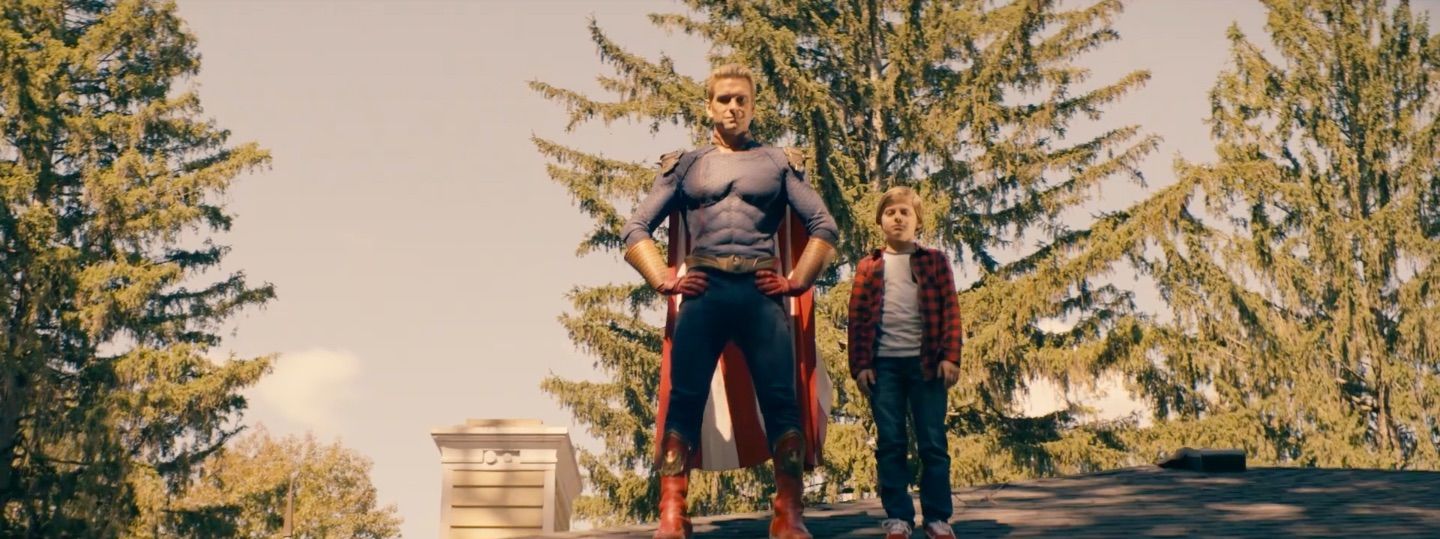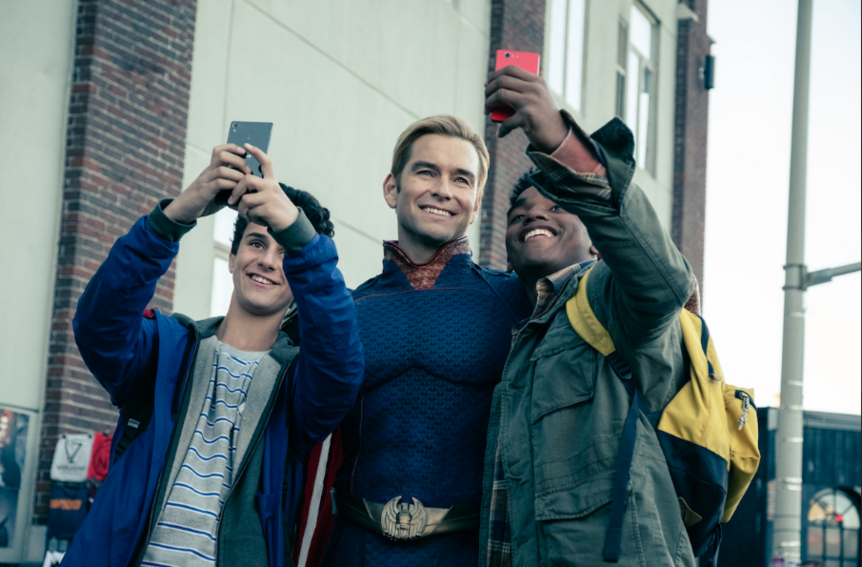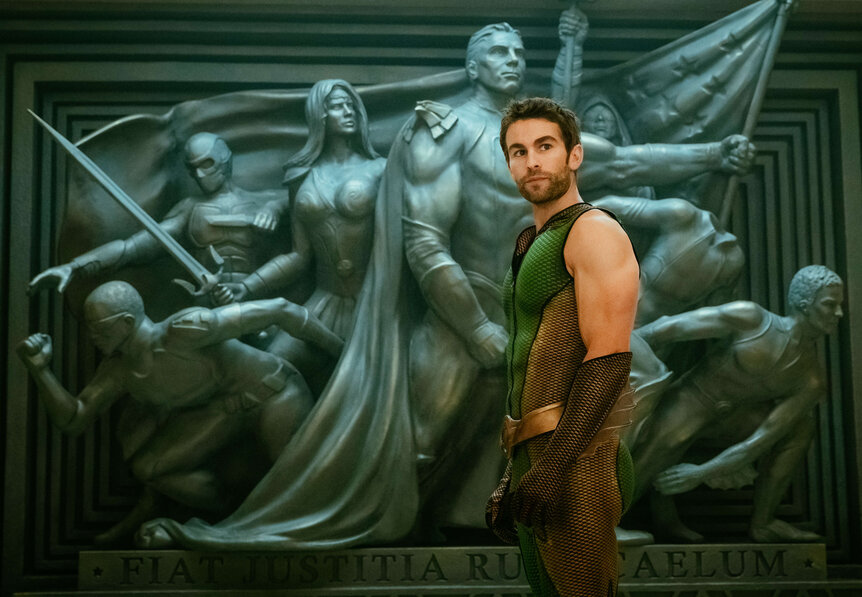Create a free profile to get unlimited access to exclusive videos, sweepstakes, and more!
The Boys Season 2 is a lesson on toxic masculinity

Superheroes aren’t born, they’re made, which was the central premise of the first season of Amazon’s The Boys. The undercurrent of Season 2 (and, indeed, the undercurrent of America) is that hate isn’t born, either. It’s taught — and so is toxic masculinity, which is at its zenith in one character, Homelander (Antony Starr), head of the superhero faction The Seven.
Born and raised in a lab without human connection, Homelander is the poster child for negligent parenting, or lack thereof. And, like so many hurt people who hurt people, Homelander goes on to instill rigid notions of masculinity and power in his newly discovered long lost son, Ryan (Cameron Crovetti). In one of the main storylines of Season 1, Ryan was conceived when Homelander raped Becca (Shantel VanSanten), the presumed-dead wife of The Seven’s main foil and unofficial head of the titular Boys, Billy Butcher (Karl Urban). This season, Homelander tries to co-parent Ryan, undoing Becca’s attempts at raising him in a normal, albeit sheltered, environment. Like so many men who believe sensitivity is a marker of weakness, Homelander easily becomes frustrated with Ryan when he won’t use his powers. This is a recurring theme for Homelander throughout Season 2, and his performative machismo betrays his fragile masculinity — like those in the real world who refuse to wear masks during a viral pandemic because they think it makes them look weak.
But Homelander’s toxic masculinity doesn’t just harm Ryan, shattering his sense of innocence.
This season seems like a response to or mirror of our increasingly fraught society. We didn’t start the fires of white supremacy that often manifest in white men of the 18–24 age bracket, as Hughie’s (Jack Quaid) hero Billy Joel once sang, but The Seven certainly stoke them this season.
For all of The Boys’ special effects and efforts at topping itself, one mid-season scene that follows a presumed incel throughout his day as he consumes a soundtrack of Fox News-type commentary and gets pulled into the depths of Reddit is perhaps the season’s best portrayal of this. He's ignored by his hot neighbor in the hallway of the apartment building he lives in with his mother, and he feels threatened by an immigrant shopkeeper. He is the Seven’s and, possibly, The Boys’ target audience. He is a prime target for the nationalist ideals the superhero septet espouses.
It’s no coincidence, then, that The Seven’s new member Stormfront (Aya Cash) shares her name with the white supremacist, anti-Semitic, Holocaust-denying website. Of course, Homelander doesn’t like his turf being tread on, much less by a woman, so the two butt heads. His fragile masculinity always betrays him, however, with Homelander burning the set of their propaganda movie to the ground to compensate for Stormfront getting the better of him.
While Homelander is the most obvious example of toxic masculinity in The Boys, he's far from the only one. The Deep (Chace Crawford) might be the most interesting example. He is disappointingly sidelined after a fascinating journey last season that spanned him sexually assaulting Starlight in the premiere to being sexually assaulted himself. Portrayed by arguably the most forgettable actor and character on Gossip Girl, Crawford imbues The Deep with a meta callback to the character that made him famous. “We moved on from Gossip Girl to playing these despicable, murderous, white male privileged guys,” he said in a Variety interview with Gossip Girl co-star Penn Badgley, who does this in his own show, You. “It’s the natural progression.”
The Boys might not be wholly equipped with the sensitivity to handle The Deep’s sexual assault survivor's journey, but The Deep reconnecting with his body and looking at his gills in a mirror for the first time was an antidote to the toxic masculinity throughout the rest of the show. It will be exciting to see how this character will continue to subvert this in the recently renewed third season.
The counterpoint to all this dick-measuring is the faux girl power between the women of the Seven, the aforementioned Stormfront, Queen Maeve, and Starlight. The three can’t stand each other, but that doesn’t sell movies and action figures. Instead, they are branded as empowered women on America’s front lines, because nothing says empowerment like glorifying war and upholding white supremacy, right?
The “Girls Get It Done” marketing around them recalls the recent downfall of #girlbosses of White Feminist™ companies, such as Audrey Gelman of the so-called feminist co-working space The Wing, who likely would have been a satirical sponsor of The Seven in an alternate version of Season 2. This leads us to question who is allowed to “get it done” (rich white women) and what “it” even is (capitalism).
The Boys also touches on this in a throwaway line about the lack of WOC and POC in The Seven, parodied in a version of the #OscarsSoWhite hashtag that went viral a few years ago and during every Academy Awards ceremony since. There’s an Alexandria Ocasio-Cortez proxy, but she seems to be there to inflame the rigid masculinity of many of the male characters and the American men who idolize them.
But what else is to be expected from a show named The Boys? Originally meant to lampoon the traditional masculinity of superhero franchises, which the show is successful in doing at times, The Boys walks the fine line between that and exhibiting the toxic masculinity that flows through our society all the way to the top. How you view it is, ultimately, up to you.
The views and opinions expressed in this article are the author's, and do not necessarily reflect those of SYFY WIRE, SYFY, or NBCUniversal.




























